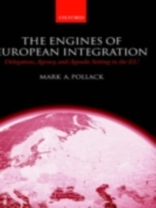The European Union is composed of its fifteen member governments, yet these governments have chosen repeatedly to delegate executive, judicial and legislative powers and substantial discretion to supranational institutions such as the Commission, the Court of Justice, and the European Parliament. In The Engines of European Integration, the first full-length study of delegation in the European Union and international politics, Mark Pollack draws on principal-agentanalyses of delegation, agency and agenda setting to analyze and explain the delegation of powers by governmental principals to supranational agents, and the role played by those agents in the process of European integration. In the first part of the book, Pollack analyses the historical and functional patterns of delegation to the Commission, the Court of Justice, and the Parliament, suggesting that delegation to the first two is motivated by a desire to reduce the transaction costs of EU policymaking, as predicted by principal-agent models, while delegation of powers to the Parliament fits poorly with such models, and primarily reflects a concern by member governments to enhance the democratic legitimacy of the Union. The second part of the book focuses on the role of supranational agents in both the liberalization and the re-regulation of the European market, and suggests that the Commission, Court, and Parliament have indeed played a causally important role alongside member governments as "the engines of integration, " but that their ability to do so has varied historically and across issue-areas as a function of the discretion delegated to them by the member governments.
Mark A. Pollack
Engines of European Integration [PDF ebook]
Delegation, Agency, and Agenda Setting in the EU
Engines of European Integration [PDF ebook]
Delegation, Agency, and Agenda Setting in the EU
购买此电子书可免费获赠一本!
语言 英语 ● 格式 PDF ● ISBN 9780191530647 ● 出版者 OUP Oxford ● 发布时间 2003 ● 下载 6 时 ● 货币 EUR ● ID 2273228 ● 复制保护 Adobe DRM
需要具备DRM功能的电子书阅读器












